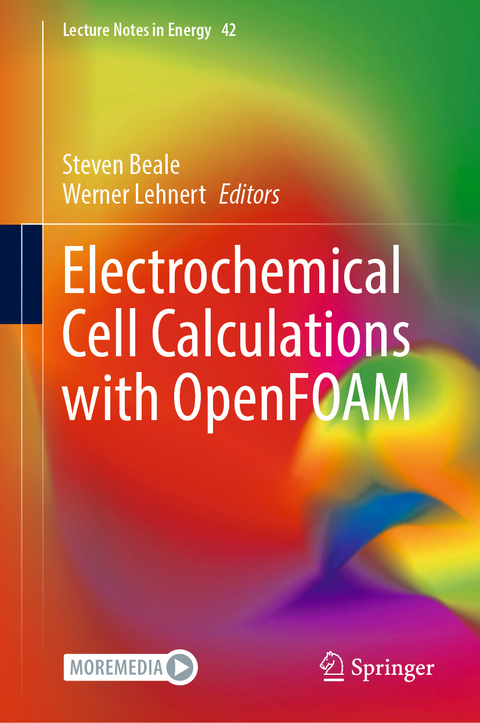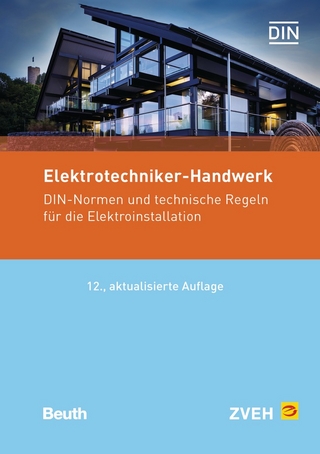
Electrochemical Cell Calculations with OpenFOAM
Springer International Publishing (Verlag)
978-3-030-92177-4 (ISBN)
This unique book is at the nexus of modern software programming practices and electrochemical process engineering. It is the authoritative text on developing open source software for many applications, including:
- fuel cells;
- electrolyzers; and
- batteries.
Written by experts in the field in the open source computational fluid dynamics (CFD) code suite OpenFOAM, this book is intended for process engineering professionals developing practical electrochemical designs for industry, as well as researchers focused on finding tomorrow's answers today. The book covers everything from micro-scale to cell-scale to stack-scale models, with numerous illustrations and programming examples. Starting from a clear explanation of electrochemical processesand simple illustrative examples, the book progresses in complexity through a range of diverse applications. After reading this book, the reader is able to take command and control of model development as an expert.
The book is aimed at all engineers and scientists with basic knowledge of calculus and programming in C++.
lt;p>Professor S.B. Beale has been conducting research in computational fluid dynamics and numerical heat and mass transfer for over 30 years. He became interested in physicochemical hydrodynamics while attending the Levich conference at Oxford University, in 1987. He first built a model of a solid-oxide fuel cell stack, in 2000. Since then, he has built models of both solid-oxide and polymer-electrolyte fuel cells at micro, cell, and stack scales using both in-house (C-programming language) and commercial CFD codes. Many projects involved external clients. For the last 10 years the open source library, OpenFOAM, was employed exclusively in his research group, which has included professional programmers, undergraduate and postgraduate students, and postdoctoral fellows. Prof. Beale is personally collaborating with several of the original developers of the OpenFOAM code and affiliates. He spearheaded the development of the openFuelCell project, which is available online at sourceForge. Professor Beale is operating agent (chair) of Annex 37 - fuel cell modeling: a part of the International Energy Agency Technology Collaboration Programme on Advanced Fuel Cells. He is associate editor for the Journal of Electrochemical Energy Conversion and Storage. He has been adjunct professor in the department of mechanical and materials engineering at Queen's University, Canada, since 2003. Professor Beale has given a number of invited talks; at OpenFOAM workshops and conferences, other international conferences and workshops, as well as at prestigious research establishments such as NASA, Los Alamos National Laboratory, and Imperial College, London. Contributing a book which combines basic engineering research in electrochemical science and software best practices is a subject which, not only is Professor Beale eminently qualified to contribute, but also represents a unique and practical solution.
Professor W. Lehnert is a member of the Faculty of Mechanical Engineering at RWTH Aachen University, where he is Professor of Modeling in Electrochemical Process Engineering. In parallel, he heads the Functional Layers department at the Institute for Energy and Climate Research - Electrochemical Process Engineering at Forschungszentrum Jülich. Prof. Lehnert studied physics at the University of Bonn. He received his PhD from the University of Düsseldorf and habilitated at Ulm University. After his PhD, he was a post-doctoral researcher at Forschungszentrum Jülich, working on 3D modeling and simulation at the stack, cell, and component levels in the field of solid oxide and polymer electrolyte fuel cells. In addition to developing his own codes, he established commercial CFD software for SOFC cell modeling. After several years in the automotive industry, where he worked on fuel cell technology for mobile applications, he returned to research, where he took leading positions in the field of fuel cell research. There he conducted research primarily on polymer electrolyte fuel cells and later also on polymer electrolyte electrolysers. In the area of high-temperature polymer electrolyte fuel cells, modeling and simulation is performed at the cell and stack level. In the low-temperature area, the focus is on the simulation of two-phase flows in fuel cell and electrolyzer components. All simulations are accompanied by ex-situ, in situ and operando experiments for model validation.
Prof. Lehnert has authored more than 200 scientific papers, contributed to 18 book chapters. Prof. Lehnert has been teaching at universities since 2001. His lectures deal with applied electrochemistry, electrochemical process engineering, and modeling and simulation of electrochemical systems. More than 30 PhD students finished their PhD under his supervision in the field of fuel cells and electrolysis. At all stages of his career, he has been involved in national and international collaborations with external partners from industry oElectrochemical cell fundamentals.- The simplest possible fuel cell.- Solid oxide cell model.- High temperature polymer electrolyte model.- Stack models.- Low temperature polymer electrolyte fuel cells and two-phase flow (continuum scale).- Direct numerical simulation of porous media: Effective transport properties.- Micro-scale simulations - two-phase models, focusing on volume-of-fluid.- Implementation of pore network model in a finite volume computational fluid dynamics code.- Simulating polymer electrolyte fuel cell degradation using OpenFOAM and FAST-FC.- Redox flow batteries.- Liquid metal batteries.
| Erscheinungsdatum | 08.05.2022 |
|---|---|
| Reihe/Serie | Lecture Notes in Energy |
| Zusatzinfo | VII, 212 p. 120 illus., 84 illus. in color. |
| Verlagsort | Cham |
| Sprache | englisch |
| Maße | 155 x 235 mm |
| Gewicht | 487 g |
| Themenwelt | Technik ► Elektrotechnik / Energietechnik |
| Schlagworte | computational fluid dynamics • Electrochemistry • engineering thermodynamics • fuel cell mathematical model • Fuel cells and batteries • Fuel cell simulation • Modeling electrolyzers • modeling software for batteries • modeling software for fuel cells • Numerical model for fuel cells • OpenFOAM open source programming • Open Source Software • Open source toolbox for fuel cell |
| ISBN-10 | 3-030-92177-8 / 3030921778 |
| ISBN-13 | 978-3-030-92177-4 / 9783030921774 |
| Zustand | Neuware |
| Haben Sie eine Frage zum Produkt? |
aus dem Bereich


